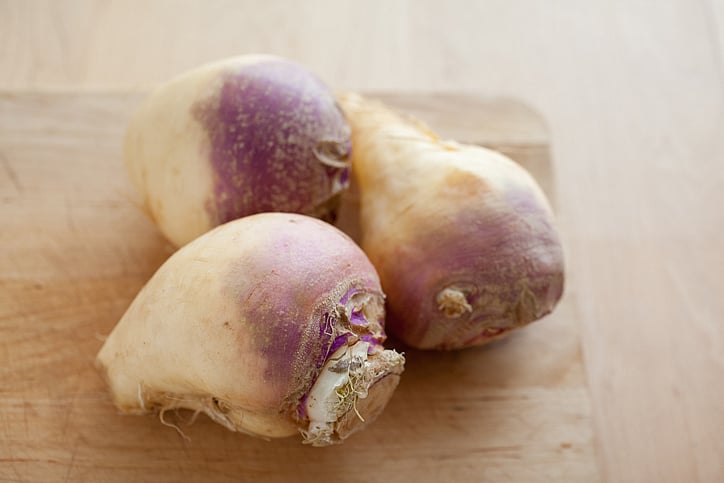5 Amazing Health Benefits of Rutabaga
Rutabaga promotes heart and digestive health. Check more benefits below.

advertisement
Health Benefits of Rutabaga: Rutabaga, a cross between a cabbage and a turnip, is a nutritious root vegetable often overlooked for its more popular counterparts like carrots and potatoes. This cruciferous vegetable, similar to turnips and belonging to the same family as cabbage, broccoli, and cauliflower, is packed with vitamins, minerals, fiber, and antioxidants.
Despite its strong, pungent flavor and earthy smell, rutabaga has a milder taste than turnips when eaten raw. When cooked, it takes on a slightly sweet, savory, and buttery flavor, reminiscent of sweet potatoes but with a slightly bitter edge.
Rutabagas, also known as Swedish turnip, are typically brownish-yellow or purple on the outside and yellow or white on the inside. They are a common ingredient in dishes across the globe, appearing in Chinese, Japanese, Indian, Scandinavian, European, British, and American cuisines.
Health Benefits of Rutabaga
Adding rutabaga to your diet may offer several health benefits, including supporting and protecting your digestive system and heart. It’s healthy and easy to add to your diet. Some of the impressive health benefits of rutabaga include the following.
1. Promotes Heart Health: Cruciferous vegetables like rutabaga, broccoli, cabbage, and kale are well-known for their health benefits, including supporting heart health. Rutabaga, in particular, is a good source of fiber, providing 4.32 grams per cup, which covers 15.4 percent of the daily value (DV) for fiber.
Fiber plays a crucial role in maintaining healthy blood lipid levels by reducing the absorption of cholesterol and increasing its excretion from the body. Additionally, the antioxidants present in rutabaga help protect against heart disease by preventing the buildup of plaque in the arteries, a condition known as atherosclerosis.
2. Supports Digestive Health: One cup of mashed rutabaga contains over 15 percent of the daily recommended value (DV) for fiber, making it an excellent choice for promoting gut health. Fiber plays a crucial role in maintaining a healthy digestive system. It helps prevent constipation by keeping stools soft and easy to pass. Additionally, fiber is essential for a balanced microbiome, the population of microorganisms in your digestive tract. Furthermore, the fiber in rutabaga can help reduce the risk of digestive diseases such as diverticular disease and colon cancer. A high-fiber diet, including regular consumption of rutabagas, can also aid in weight management by promoting feelings of satiety and preventing overeating.
3. Aid in Weight Loss: According to studies, incorporating rutabagas into your diet may aid in weight loss. This root vegetable, known for its high fiber content, promotes a feeling of fullness that can help prevent overeating. Furthermore, a diet rich in fiber has been linked to a more diverse gut bacteria composition, which recent research suggests plays a crucial role in preventing long-term weight gain. Substituting nutrient-rich, low-calorie foods like rutabagas for unhealthy, high-calorie options can further contribute to weight management. Eating nutrient-rich, low-calorie rutabagas can replace unhealthy options high in calories, fat, and sugar.
4. Prevent Cancer: Rutabagas, a member of the cruciferous vegetable family, are packed with nutrients and offer a variety of health benefits. Cruciferous vegetables are known for their cancer-fighting properties, and rutabagas are no exception. They contain glucosinolates, sulfur-containing compounds that break down into compounds in the body that help fight cancer.
5. Prevent Chronic Disease: Rutabagas are rich in antioxidants like carotenoids, vitamin C, and vitamin E. These antioxidants help protect cells from oxidative damage and may help prevent chronic health conditions. Additionally, antioxidants support a healthy immune system and protect organs from free radicals.
(Disclaimer: Parts of this article were generated by AI and published after the content was editorially modified and verified by a human based on their own judgement and expertise. The Quint does not publish AI-generated content without direct human involvement and oversight).